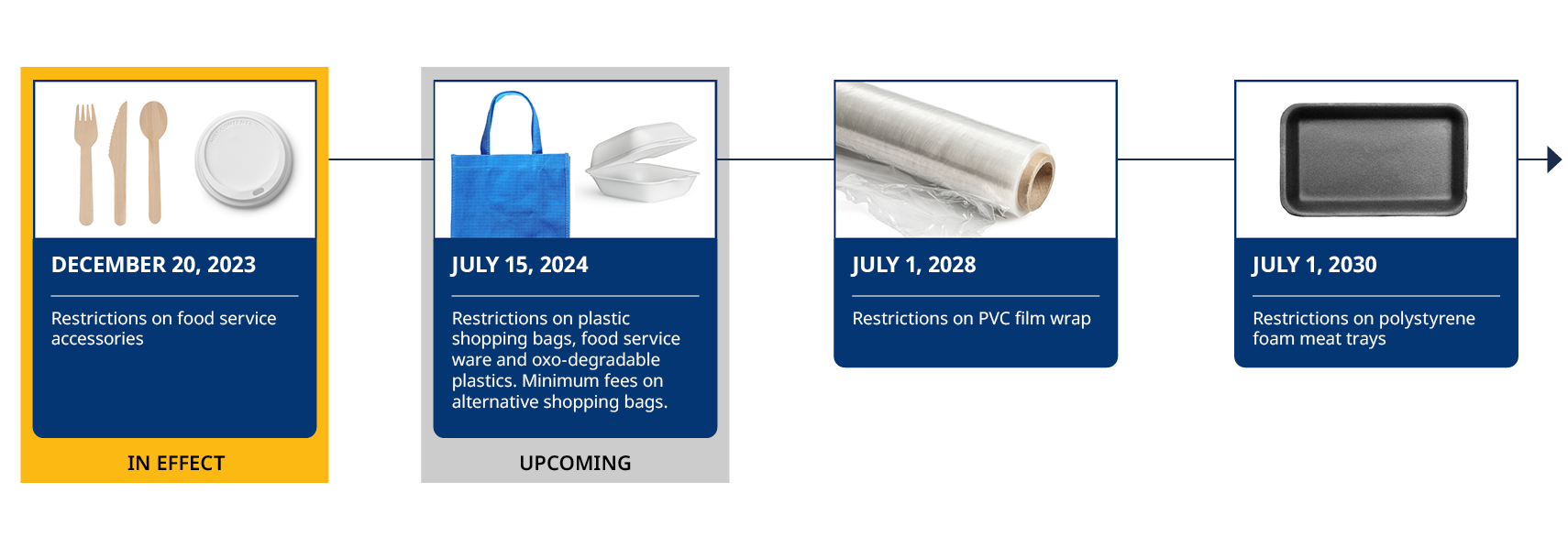Single-Use and Plastic Waste Prevention Regulation
Through the Single-Use and Plastic Waste Prevention Regulation, B.C. is phasing out certain single-use and plastic items to reduce waste and pollution. Learn about the regulation and how it impacts you.
On this page
The Single-Use and Plastic Waste Prevention Regulation
The Single-Use and Plastic Waste Prevention Regulation provides a framework to:
- Phase out certain single-use and plastic items
- Address waste and pollution in B.C.
Under the regulation, plastic means all plastics, including compostable and biodegradable plastics.
Regulation timeline
- December 20, 2023: Restrictions on food service accessories
- July 15, 2024: Restrictions on plastic shopping bags, food service ware and oxo-degradable plastics. Minimum fees on alternative shopping bags
- July 1, 2028: Restriction on PVC film wrap
- July 1, 2030: Restrictions on polystyrene foam meat trays
Learn more about each section of the regulation:
- Shopping bags
- Disposable food service accessories
- Food service ware
- Oxo-degradable plastics
- Compostable plastics
Review translated factsheets about each section of the regulations in: 繁體中文, 简体中文, Français, ਪੰਜਾਬੀ and Tagalog
Shopping bags
Businesses can no longer provide customers with single-use plastic shopping bags. As of July 15, 2024, businesses must also charge $2.00 for new reusable shopping bags and $0.25 for new paper shopping bags.
Certain bags, like those available in-store for fruit and vegetables, are not considered shopping bags. These may be offered free of charge.
Learn more about the regulation in the shopping bags factsheet (PDF, 1.1 MB).
Food service accessories
Food service providers can no longer offer single-use (disposable) plastic utensils. Food service providers can give out other disposable items, like wooden spoons, only on request.
Food service accessories include utensils, straws, napkins, condiments, garnishes and drink cup lids and sleeves.
To request a disposable food service accessory, a customer may:
- Ask for the item
- Take it from a self-serve station
- Accept it when offered by staff or through an online form
Learn more about the regulation in the food service accessories factsheet (PDF, 525KB)
Food service ware
As of July 15, 2024, businesses are restricted from selling or distributing single-use food service ware made with certain hard-to-recycle plastics. See the list of restricted plastics below.
Food service ware includes:
- Disposable take-out containers
- Some packaging used to hold food and drinks
- This includes certain bowls, boxes, cartons, cups, plates, platters, trays, hinged containers, lidded containers, egg cartons, and film wrap
Hard-to-recycle plastics include:
- Biodegradable plastics
- Compostable plastics
- Oxo-degradable plastics
- Polystyrene foam
- PVC
- PVDC
To allow for a smooth transition, businesses can use PVC film wrap until 2028. Polystyrene foam meat trays can be used to package raw protein, in a state not ready to be eaten, until 2030.
Learn more about the regulation in the food service ware factsheet (PDF, 1.1MB).
Oxo-degradable plastics
As of July 15, 2024, businesses can no longer sell or distribute any packaging or single-use (disposable) products that contain oxo-degradable plastic.
Products containing oxo-degradable plastics are often marketed as biodegradable, green, or eco-friendly. However, oxo-degradable plastics contain additives that break down into microplastics that pollute the environment.
Learn more about the regulation in the oxo-degradable factsheet (PDF, 533KB).
Compostable plastics
Businesses can no longer sell or distribute single-use (disposable) utensils that contain compostable plastic. As of July 15, 2024, compostable plastic shopping bags and take-out containers will also be banned.
Compostable plastics need specific conditions to break down. In B.C., they often cannot be composted or recycled. Instead, they end up in the landfill. Until these products can be easily composted in B.C.’s composting facilities, recyclable items are a better option.
Learn more about the regulation in the compostable plastics factsheet (PDF, 676KB).
Compliance and Enforcement
We encourage all businesses to take reasonable steps to follow the regulation. To support this, we’re focused on ongoing education, outreach and raising awareness of the requirements. Businesses must follow all relevant local, provincial and federal laws.
- Learn more about how single-use plastics laws work together
All B.C. businesses must follow the regulation. To report a known or suspected violation, use the online report form: Single-Use and Plastic Waste Prevention Regulation Report Form
British Columbia’s environmental compliance model uses a consistent, risk-based approach to ensure compliance.
- Visit Environmental Compliance in B.C. to learn more about the Province’s compliance approach

